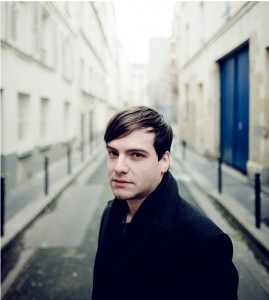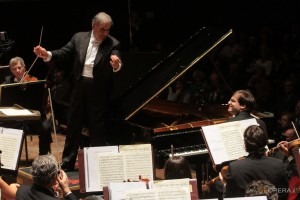Telling a personal story

Credit: http://francescopiemontesi.com/
Away from the rolling hills of northern Italy, Piemontesi’s second home must surely be the stage; he has performed around the world and collaborated with some of the best musicians of many generations, including Charles Dutoit, Sir Roger Norrington, and Vasily Petrenko. With this said, before he flies to Washington for a solo recital he’s nipping to France for a lesson. ‘I’ll never stop lessons,’ he says determinedly. ‘Past a certain point, where you know how to play the instrument technically, it becomes less of a lesson and more “advice”.
‘It’s important to remember that no matter how original your ideas are, they’re still your own, and you’re playing the piece in a certain way. A different person with a different approach will think different things, and it’s refreshing.’

Zubin Mehta and Francesco Piemontesi at Maggio Musicale Fiorentino
Credit: http://www.gbopera.it/
Similarly, does a worldwide icon have idols? Who does he aspire to?
‘I mostly look to the past. Ignaz Friedmann and Leopold Godowsky, for example, both had an unmistakeable sound quality. They made the piano sound like an orchestra, like a totally flexible group of instruments. This sound is something missing when I listen to more recent recordings.
‘In this digital age, stress is placed on exactitude, and these other aspects get lost. I prefer to listen to old recordings – they tell you a story. I always try to have a personal story to the music. Even though this is abstract, and no one can tell exactly what story you’re thinking of, my stories are informed by the voice leading, the harmony, and so on.’
Stravinsky, Berceuse, Finale from the Firebird
In Piemontesi’s eyes, there is a tale to be told with every piece of music, forming a fundamental part of the learning process. And what better way to learn about musical storytelling than studying vocal music, where the exact text is there in front of you?
‘Most of the great composers wrote vocal music, and studying this is my biggest help. You can see the text, and see how they illustrate words with their music. You can find so many melodies from Schubert’s songs in his piano sonatas; to have the text in mind is very useful.’
Piemontesi recently made his Royal Festival Hall debut with the Philharmonia Orchestra; will he be returning to UK shores in the near future? ‘I greatly enjoy playing with the Philharmonia,’ he says happily. ‘I have a very strong relationship with them now, and the conductor I worked with recently [Jérémie Rhorer] was excellent.
‘I tend to work with conductors whom I know well. You know how to work together, and you know what to expect!’
Francesco Piemontesi’s next performances are on 6 June in Washington DC, 17 June in Bellinzona, Switzerland, and 2 August at the BBC Proms.
Official Website




